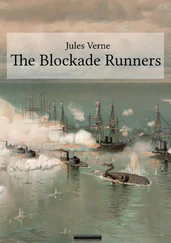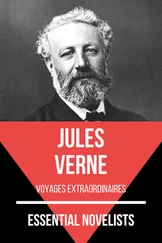“But if there’s a captain,” replied Bolton, “I’ll bet two months’ pay we shall see him before long.”
“I should like to tell the captain a bit of my mind,” said Pen.
“Who’s talking about the captain?” said a newcomer. It was Clifton, the sailor, a superstitious and envious man. “Is anything new known about the captain?” he asked.
“No,” they all answered at once.
“Well, I believe we shall find him one fine morning installed in his cabin, and no one will know how he got there.”
“Get along, do!” replied Bolton. “Why, Clifton, you imagine that he’s a hobgoblin—a sort of wild child of the Highlands.”
“Laugh as much as you like, Bolton, you won’t change my opinion. Every day as I pass his cabin I look through the keyhole. One of these fine mornings I shall come and tell you what he’s like.”
“Why, he’ll be like everyone else,” said Pen, “and if he thinks he’ll be able to do what he likes with us, he’ll find himself mistaken, that’s all!”
“Pen don’t know him yet,” said Bolton, “and he’s beginning to quarrel with him already.”
“Who doesn’t know him?” said Clifton, looking knowing; “I don’t know that he don’t!”
“What the devil do you mean?” asked Gripper.
“I know very well what I mean.”
“But we don’t.”
“Well, Pen has quarrelled with him before.”
“With the captain?”
“Yes, the dog-captain—it’s all one.”
The sailors looked at one another, afraid to say anything.
“Man or dog,” muttered Pen, “I declare that that animal will have his account one of these days.”
“Come, Clifton,” asked Bolton seriously, “you don’t mean to say that you believe the dog is the real captain?”
“Indeed I do,” answered Clifton with conviction. “If you noticed things like I do, you would have noticed what a queer beast it is.”
“Well, tell us what you’ve noticed.”
“Haven’t you noticed the way he walks on the poop with such an air of authority, looking up at the sails as if he were on watch?”
“That’s true enough,” added Gripper, “and one evening I actually found him with his paws on the paddle-wheel.”
“You don’t mean it!” said Bolton.
“And now what do you think he does but go for a walk on the icefields, minding neither the bears nor the cold?”
“That’s true enough,” said Bolton.
“Do you ever see that ‘ere animal, like an honest dog, seek men’s company, sneak about the kitchen, and set his eyes on Mr. Strong when’s he taking something good to the commander? Don’t you hear him in the night when he goes away two or three miles from the vessel, howling fit to make your blood run cold, as if it weren’t easy enough to feel that sensation in such a temperature as this? Again, have you ever seen him feed? He takes nothing from any one. His food is always untouched and unless a secret hand feeds him on board, I may say that he lives without eating, and if he’s not unearthly, I’m a fool!”
“Upon my word,” said Bell, the carpenter, who had heard all Clifton’s reasoning, “I shouldn’t be surprised if such was the case.” The other sailors were silenced.
“Well, at any rate, where’s the Forward going to?”
“I don’t know anything about it,” replied Bell. “Richard Shandon will receive the rest of his instructions in due time.”
“But from whom?”
“From whom?”
“Yes, how?” asked Bolton, becoming pressing.
“Now then, answer, Bell!” chimed in all the other sailors.
“By whom? how? Why, I don’t know,” said the carpenter, embarrassed in his turn.
“Why, by the dog-captain,” exclaimed Clifton. “He has written once already; why shouldn’t he again? If I only knew half of what that ‘ere animal knows, I shouldn’t be embarrassed at being First Lord of the Admiralty!”
“So then you stick to your opinion that the dog is the captain?”
“Yes.”
“Well,” said Pen in a hoarse voice, “if that ‘ere animal don’t want to turn up his toes in a dog’s skin, he’s only got to make haste and become a man, or I’m hanged if I don’t settle him.”
“What for?” asked Garry.
“Because I choose,” replied Pen brutally; “besides, it’s no business of any one.”
“Enough talking, my boys,” called out Mr. Johnson, interfering just in time, for the conversation was getting hot. “Get on with your work, and set up your saws quicker than that. We must clear the iceberg.”
“What! on a Friday?” replied Clifton, shrugging his shoulders. “You’ll see she won’t get over the Polar circle as easily as you think.”
The efforts of the crew were almost powerless during the whole day. The Forward could not separate the icefields even by going against them full speed, and they were obliged to anchor for the night. On Saturday the temperature lowered again under the influence of an easterly wind. The weather cleared up, and the eye could sweep over the white plains in the distance, which the reflection of the sun’s rays rendered dazzling. At seven in the morning the thermometer marked eight degrees below zero. The doctor was tempted to stay quietly in his cabin, and read the Arctic voyages over again; but, according to his custom, he asked himself what would be the most disagreeable thing he could do, which he settled was to go on deck and assist the men to work in such a temperature. Faithful to the line of conduct he had traced out for himself, he left his well-warmed cabin and came to help in hauling the vessel. His was a pleasant face, in spite of the green spectacles by which he preserved his eyes from the biting of the reflected rays; in his future observations he was always careful in making use of his snow spectacles, in order to avoid ophthalmia, very frequent in these high latitudes.
Towards evening the Forward had made several miles further north, thanks to the activity of the men and Shandon’s skill, which made him take advantage of every favourable circumstance; at midnight he had got beyond the sixty-sixth parallel, and the fathom line declared twenty-three fathoms of water; Shandon discovered that he was on the shoal where Her Majesty’s ship Victoria struck, and that land was drawing near, thirty miles to the east. But now the heaps of ice, which up till now had been motionless, divided and began to move; icebergs seemed coming from every point of the horizon; the brig was entangled in a series of moving rocks, the crushing force of which it was impossible to resist. Moving became so difficult that Garry, the best helmsman, took the wheel; the mountains had a tendency to close up behind the brig; it then became essential to cut through the floating ice, and prudence as well as duty ordered them to go ahead. Difficulties became greater from the impossibility that Shandon found in establishing the direction of the vessel amongst such changing points, which kept moving without offering one firm perspective. The crew was divided into two tacks, larboard and starboard; each one, armed with a long perch with an iron point, drove back the two threatening blocks. Soon the Forward entered into a pass so narrow, between two high blocks, that the extremity of her yards struck against the walls, hard as rock; by degrees she entangled herself in the midst of a winding valley, filled up with eddies of snow, whilst the floating ice was crashing and splitting with sinister cracklings. But it soon became certain that there was no egress from this gullet. An enormous block, caught in the channel, was driving rapidly on to the Forward ! It seemed impossible to avoid it, and equally impossible to back out along a road already obstructed.
Shandon and Johnson, standing on the prow, were contemplating the position. Shandon was pointing with his right hand at the direction the helmsman was to take, and with his left was conveying to James Wall, posted near the engineer, his orders for the working of the machine.
Читать дальше












